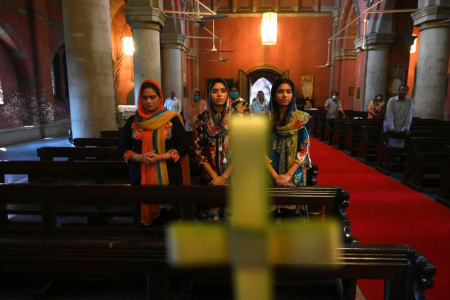Pakistani Christian woman jailed on blasphemy charges after Muslim leader's accusation

A Christian woman in Pakistan has been arrested and charged with blasphemy after a Muslim prayer leader accused her of burning passages of Islamic scripture, sources said.
Gojra Saddar police in Toba Tek Singh District, Punjab Province, on Dec. 21 arrested Shazia Younis, a mother of two children, on the complaint of Atta Ul Mustafa, prayer leader of a mosque in her village, Chak No. 180-GB Mongi Bangla.
Gojra-based attorney Haneef Matto said the 50-year-old housewife was sent into judicial custody the same day she was arrested.
“According to their neighbors, Shazia’s husband Younis and her two sons, one of whom is married, have gone underground due to security fears,” Matto told Christian Daily International-Morning Star News. “They are a poor family, and Shazia’s husband and sons earn livelihood as daily wage laborers.”
Mustafa, the complainant, stated in the FIR that he was in a market on Dec. 21 when two local Muslims, Muhammad Imran and Rab Nawaz, informed him that Shazia Younis had set fire to books outside her doorstep.
“The material set ablaze included a book of Islamiyat, which contained Islamic scripture,” Mustafa stated in the FIR, claiming also that Shazia Younis had admitted to him to desecrating the pages.
“Shazia has hurt the religious sentiments of Muslims, and she should therefore be punished as per the relevant law,” he stated in the complaint.
Police arrested her and charged her under Section 295-B of Pakistan’s widely condemned blasphemy law relating to desecration of the Quran, punishable by life in prison.
Intent must be shown for a blasphemy conviction, and Matto said the FIR doesn't indicate any ill intention behind the alleged blasphemy.
“I haven’t yet spoken directly to the family, but from my experience of dealing with such cases, I think that it is possible that Younis was burning waste paper, which inadvertently included the Islamiyat book,” Matto told Christian Daily International-Morning Star News.
The complainant, being a Muslim leader, could have addressed the matter amicably but instead registered a case against the impoverished Christian, an act that was excessive, Matto said.
The Christian attorney, who is also defending two Christian sisters charged with Quran desecration in another village in Gojra, said it was unfortunate that Younis was targeted by the blasphemy law just four days before Christmas.
Minorities Alliance Pakistan President Akmal Bhatti condemned the arrest, saying that putting innocent people in jail over false allegations of blasphemy highlighted the need for procedural reforms in the controversial law.
“The police instantly register blasphemy FIRs and arrest people without investigating the charges to appease the mobs,” Bhatti told Christian Daily International-Morning Star News. “This trend has resulted in a phenomenal increase in false allegations of blasphemy that has sometimes resulted in violent attacks on Christian neighborhoods and lynching of the accused.”
UNHRC urges amending of laws
Expressing alarm over an increase in false blasphemy accusations in Pakistan, the U.N. Human Rights Committee on Nov. 7 urged repeal or amending of the country’s harsh blasphemy laws.
The committee noted that false blasphemy accusations led to Islamist mob violence and recommended amending the laws in accordance with requirements of the International Covenant on Civil and Political Rights (ICCPR).
In its concluding observations of the committee’s second periodic report on Pakistan, it stated concern over sections 295 and 298 of the Pakistan Penal Code, which carry severe penalties, including the death penalty, and have a disproportionate impact on religious minorities.
“It is also concerned about the increasing number of persons incarcerated under blasphemy charges, the high number of blasphemy cases based on false accusations, violence against those accused of blasphemy, fostering vigilante justice, and allegations of entrapment of persons, in particular young persons, on accusations of online blasphemy under cybercrime laws,” the committee stated.
It emphasized ending use of cybercrime laws, such as the Prevention of Electronic Crimes Act (PECA) 2016, to prosecute and detain those accused of breaching blasphemy laws online. The committee also urged the government to investigate allegations of massive abuse of blasphemy laws in connection with cybercrime laws and publish the results of the inquiries.
“[The committee] is also concerned about the chilling effect that criminal defamation laws, blasphemy, sedition and counter-terrorism laws, and other recently passed legislation have on the exercise of freedom of expression by journalists, activists, human rights defenders and members of ethnic and religious minorities,” it stated.
Urging Pakistan to take all necessary measures to guarantee prompt and fair trials for all persons charged with blasphemy or other offenses against religion, the committee highlighted jail conditions, stating that it was “also concerned about reports of abuse of women prisoners, including sexual violence, and that individuals accused of blasphemy are often placed in solitary confinement for extended periods of time. It remains concerned about the widespread recourse to prolonged pretrial detention.”
Pakistan ranked seventh on Open Doors’ 2024 World Watch List of the most difficult places to be a Christian, as it was the previous year.
This article was originally published at Christian Daily International–Morning Star News





















